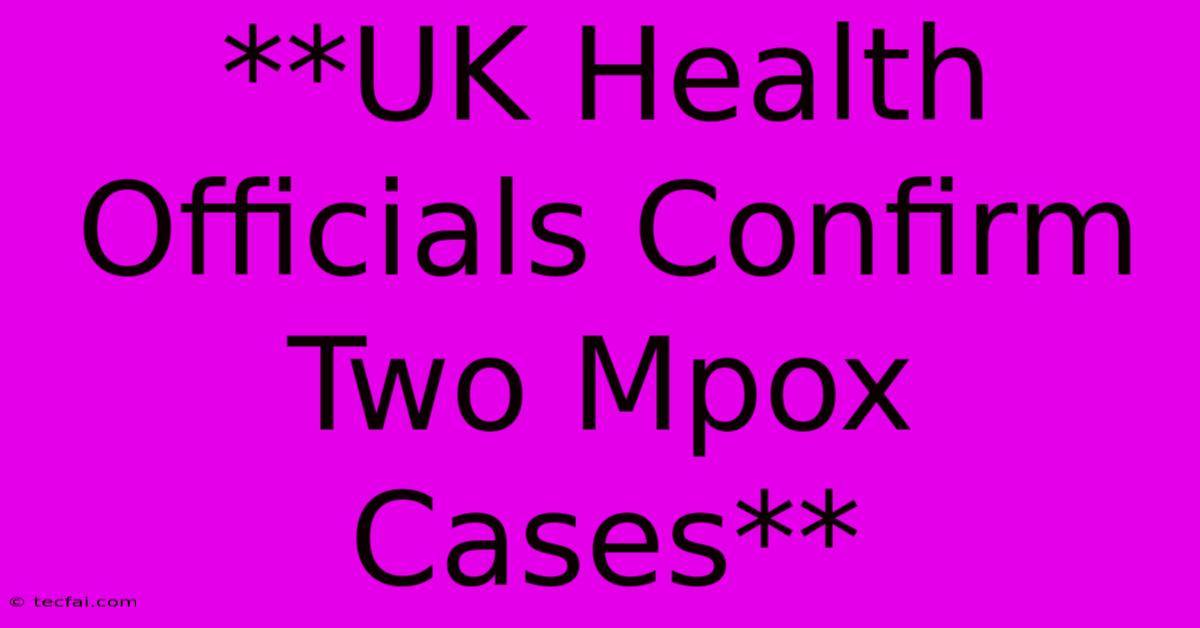**UK Health Officials Confirm Two Mpox Cases**

Discover more detailed and exciting information on our website. Click the link below to start your adventure: Visit Best Website tecfai.com. Don't miss out!
Table of Contents
UK Health Officials Confirm Two Mpox Cases: What You Need to Know
The UK Health Security Agency (UKHSA) has confirmed two cases of mpox in England, marking the first cases in the country since 2022. The individuals, who are both men, are linked to recent travel to West Africa. While the news may be concerning, experts are emphasizing that the risk to the general public remains low.
What is Mpox?
Mpox, formerly known as monkeypox, is a rare viral disease that can cause a range of symptoms including:
- Fever
- Headache
- Muscle aches
- Backache
- Swollen lymph nodes
- Rash
The rash often begins as flat, red lesions that can progress to blisters and eventually crust over.
Transmission and Prevention
Mpox is primarily spread through close contact with an infected person or animal. Transmission can occur through:
- Direct contact with the rash or body fluids
- Contact with contaminated materials such as bedding or clothing
- Respiratory droplets during prolonged face-to-face contact
To minimize your risk of contracting mpox, follow these precautions:
- Avoid close contact with people who are sick
- Wash your hands frequently with soap and water
- Clean and disinfect surfaces that may have been contaminated
- Avoid contact with wild animals, especially rodents
What to Do If You Have Symptoms
If you have recently traveled to West Africa or have been in close contact with someone who has mpox, and you are experiencing symptoms, it's crucial to contact your doctor immediately.
Early detection and treatment are essential to preventing further spread and managing the illness.
The UKHSA Response
The UKHSA is closely monitoring the situation and working to identify any potential contacts of the two confirmed cases. They are also providing guidance to healthcare professionals on how to diagnose and manage mpox.
The UKHSA is emphasizing the importance of public health measures to prevent further spread of the virus.
A Reminder of Public Health Importance
The confirmation of these two cases serves as a reminder of the ongoing threat of infectious diseases and the importance of staying informed about public health recommendations.
While the risk to the general public remains low, maintaining awareness and practicing good hygiene habits can help protect ourselves and our communities.

Thank you for visiting our website wich cover about **UK Health Officials Confirm Two Mpox Cases**. We hope the information provided has been useful to you. Feel free to contact us if you have any questions or need further assistance. See you next time and dont miss to bookmark.
Featured Posts
-
Paul Mescals Gladiator 2 Wish Crowes Return
Nov 05, 2024
-
Track The 2024 Us Election Vote Map
Nov 05, 2024
-
Mlse Proceeds Used For Ziply Purchase Bell Shares Fall
Nov 05, 2024
-
Panoorin Dallas Vs Indiana Sa Kfaa
Nov 05, 2024
-
Vote By Bike Find Accessible Dropboxes
Nov 05, 2024
